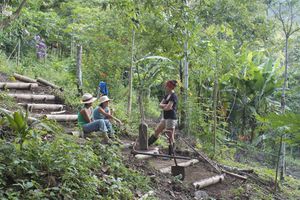
The aim of this page is to recognise, celebrate and encourage the self-empowerment of community agency networks (CANs) and community groups' activism for climate, environment and many other sustainability topics across Ecuador.
 Plastic-choked rivers in Ecuador are being cleared with conveyor belts, BBC Future (Apr 22, 2024)
Plastic-choked rivers in Ecuador are being cleared with conveyor belts, BBC Future (Apr 22, 2024)  How Jocotoco Foundation, an Ecuadorian non-profit protects 10% of the world’s bird species, news.mongabay.com (Dec 11, 2023)
How Jocotoco Foundation, an Ecuadorian non-profit protects 10% of the world’s bird species, news.mongabay.com (Dec 11, 2023)  Agroforestry chocolate helping save the world’s most endangered rainforest, by Liz Kimbrough, news.mongabay.com (Sep 12, 2023)
Agroforestry chocolate helping save the world’s most endangered rainforest, by Liz Kimbrough, news.mongabay.com (Sep 12, 2023)
Networks, sustainability initiatives and community involvement[edit | edit source]
- Neighbourhood initiatives across Quito
Ecovillages
Organisations working with communities
Acción Ecológica is one of the main environmental organizations in Ecuador. It is based in Quito, and was founded by Ivonne Yánez.
It campaigns on a range of issues including oil extraction, exploration and pipeline transport, Amazon rainforest protection, food sovereignty, biofuels and plantations for carbon offsets.
- Ecological Action, added 21:44, 11 November 2021 (UTC)
Visions[edit | edit source]
Amazon Sacred Headwaters Initiative, added 16:45, 22 March 2022 (UTC)
Food activism[edit | edit source]
la Red de Guardianes de Semillas (the Seed Savers' Network)
Ethical consumerism[edit | edit source]
Sustainable tourism: intagturismo.com
Sustainable transport[edit | edit source]
Cuenca's tramway is the largest public transport system in the city and the first modern tramway in Ecuador. It was inaugurated on March 8, 2019. It has 20.4 kilometers (12.7 mi) and 27 stations. It will transport 120,000 passagers daily. Its route starts in the south of Cuenca and ends in the north at the Parque Industrial neighbourhood. W
Cycling activism[edit | edit source]
The Ciclopaseo is a project created by Biciaccion Foundation. It was administered by this organization from 2003 until 2007, from there it was organized by the local organization Ciclopolis until 2017. Nowadays the local traffic law enforcement organisation (Agencia Metropolitana de Tránsito by the Spanish name) is administering the project. A route of 30 km running from the North to South of the city is closed to traffic every Sunday from 8 am until 2 pm to give preference to cyclists and pedestrians. The project is run in cooperation with the Municipality and features diverse locations of the city from Carolina Park, Ejido Park the Historic Center of Quito, Avenue Rio Amazonas, and The Panecillo. [1]
Ecological restoration[edit | edit source]

This page is the beginnings of a portal for Ecuador community action in response to Ecological emergency.
Towards sustainable economies[edit | edit source]
FLOK Society Free/Libre Open Knowledge Society, designing a world for the commons. Diseñando un cambio de matriz productiva hacia la sociedad del conocimiento libre, común y abierto - FLOK Society (EN) (wiki)
See also: Open-source hardware for science in Ecuador
About Ecuador[edit | edit source]
Ecuador, officially the Republic of Ecuador, is a country in northwestern South America, bordered by Colombia on the north, Peru on the east and south, and the Pacific Ocean on the west. It also includes the Galápagos Islands in the Pacific, about 1,000 kilometers (621 mi) west of the mainland. The country's capital is Quito and its largest city is Guayaquil.
The territories of modern-day Ecuador were once home to a variety of indigenous peoples that were gradually incorporated into the Inca Empire during the 15th century. The territory was colonized by Spanish Empire during the 16th century, achieving independence in 1820 as part of Gran Colombia, from which it emerged as a sovereign state in 1830. The legacy of both empires is reflected in Ecuador's ethnically diverse population, with most of its 17.8 million people being mestizos, followed by large minorities of Europeans, Native American, African, and Asian descendants. Spanish is the official language spoken by a majority of the population, although 13 native languages are also recognized, including Quechua and Shuar.
Near you[edit | edit source]
External links




